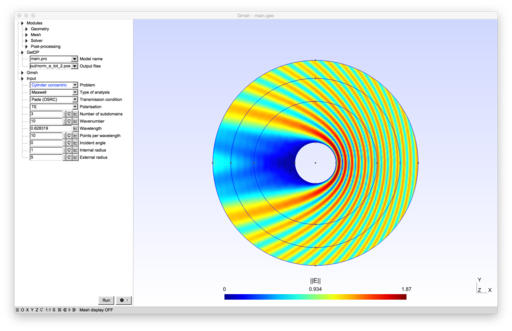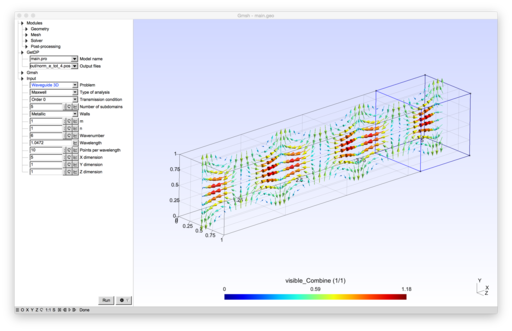Difference between revisions of "Domain decomposition methods for waves"
| (21 intermediate revisions by the same user not shown) | |||
| Line 1: | Line 1: | ||
| − | {{ | + | {{metamodelGetDP|ddm_waves}} |
| − | == | + | == Additional information == |
| − | To run the | + | To run the models, open '''main.pro''' with Gmsh. (This is mainly for demonstration purposes. For actual, parallel computations, you should recompile GetDP and Gmsh with MPI support, and run from the command line: see [[GetDDM]] for detailed installation instructions). |
| − | The formulations implement non-overlapping Schwarz domain decomposition methods for the Helmholtz equation and for the time-harmonic Maxwell system. Several families of transmission conditions are implemented: zeroth- and second-order optimized conditions<ref name=Despres1 /><ref name=Despres2 /><ref name=Gander1 /><ref name=Gander2 />, | + | The formulations implement non-overlapping Schwarz domain decomposition methods for the Helmholtz equation and for the time-harmonic Maxwell system. Several families of transmission conditions are implemented: zeroth- and second-order optimized conditions<ref name=Despres1 /><ref name=Despres2 /><ref name=Gander1 /><ref name=Gander2 /><ref name=Boubendir1 /><ref name=RawatL10 />, new Padé-localized square-root conditions<ref name=BoubAntGeuz2012 /><ref name=ElBouAntGeuz2014 /> and PML conditions. Several variants of the recently proposed double-sweep preconditioner<ref name=VionGeuz2014 /> are also implemented. |
| + | |||
| + | For more information about these methods as well as the implementation, please refer to the following preprint: [http://www.montefiore.ulg.ac.be/~geuzaine/preprints/getddm_preprint.pdf GetDDM: an Open Framework for Testing Optimized Schwarz Methods for Time-Harmonic Wave Problems] <ref name=GetDDM />. | ||
== References == | == References == | ||
| Line 24: | Line 26: | ||
Element Method, Numerische Mathematik 103(4), pp.515-537, (2006).</ref> | Element Method, Numerische Mathematik 103(4), pp.515-537, (2006).</ref> | ||
| − | <ref name=BoubAntGeuz2012>Y. Boubendir, X. Antoine | + | <ref name=RawatL10>V. Rawat and J.-F. Lee, Nonoverlapping Domain Decomposition with Second Order Transmission Condition for the Time-Harmonic Maxwell's Equations, SIAM Journal on Scientific Computing, 32(6), pp. 3584-3603, 2010.</ref> |
| + | |||
| + | <ref name=BoubAntGeuz2012>Y. Boubendir, X. Antoine and C. Geuzaine. [http://www.montefiore.ulg.ac.be/~geuzaine/preprints/ddm_helmholtz_preprint.pdf A quasi-optimal non-overlapping domain decomposition algorithm for the Helmholtz equation]. Journal of Computational Physics 231 (2), 262-280, 2012.</ref> | ||
| + | |||
| + | <ref name=ElBouAntGeuz2014>M. El Bouajaji, X. Antoine and C. Geuzaine. [http://www.montefiore.ulg.ac.be/~geuzaine/preprints/osrc_maxwell_preprint.pdf Approximate local magnetic-to-electric surface operators for time-harmonic Maxwell’s equations]. Journal of Computational Physics 279 241-260, 2014.</ref> | ||
| + | |||
| + | <ref name=VionGeuz2014>A. Vion and C. Geuzaine. [http://www.montefiore.ulg.ac.be/~geuzaine/preprints/ddm_double_sweep_preprint.pdf Double sweep preconditioner for optimized Schwarz methods applied to the Helmholtz problem]. Journal of Computational Physics 266, 171-190, 2014.</ref> | ||
| + | |||
| + | <ref name=GetDDM>B. Thierry, A.Vion, S. Tournier, M. El Bouajaji, D. Colignon, N. Marsic, X. Antoine, C. Geuzaine. [http://www.montefiore.ulg.ac.be/~geuzaine/preprints/getddm_preprint.pdf GetDDM: an Open Framework for Testing Optimized Schwarz Methods for Time-Harmonic Wave Problems]. 2015.</ref> | ||
</references> | </references> | ||
| − | {{metamodelfooter| | + | {{metamodelfooter|ddm_waves}} |
Latest revision as of 09:41, 25 July 2015
|
Optimized Schwarz domain decomposition methods for time-harmonic wave problems
|
 
|
|---|
|
Download model archive (ddm_waves.zip) |
Additional information
To run the models, open main.pro with Gmsh. (This is mainly for demonstration purposes. For actual, parallel computations, you should recompile GetDP and Gmsh with MPI support, and run from the command line: see GetDDM for detailed installation instructions).
The formulations implement non-overlapping Schwarz domain decomposition methods for the Helmholtz equation and for the time-harmonic Maxwell system. Several families of transmission conditions are implemented: zeroth- and second-order optimized conditions[1][2][3][4][5][6], new Padé-localized square-root conditions[7][8] and PML conditions. Several variants of the recently proposed double-sweep preconditioner[9] are also implemented.
For more information about these methods as well as the implementation, please refer to the following preprint: GetDDM: an Open Framework for Testing Optimized Schwarz Methods for Time-Harmonic Wave Problems [10].
References
- ↑ B. Després, Méthodes de Décomposition de Domaine pour les Problèmes de Propagation d'Ondes en Régime Harmonique. Le Théorème de Borg pour l'Equation de Hill Vectorielle, PhD Thesis, Paris VI University, France, 1991.
- ↑ B. Després, P. Joly and J. Roberts, A domain decomposition method for the harmonic Maxwell equations, Iterative methods in linear algebra (Brussels, 1991), pp. 475-484, North-Holland, 1992.
- ↑ M. Gander, F. Magoulès and F. Nataf, Optimized Schwarz methods without overlap for the Helmholtz equation}, SIAM Journal on Scientific Computing, 24(1), pp. 38-60, 2002.
- ↑ V. Dolean, M. Gander and L. Gerardo-Giorda, Optimized Schwarz methods for Maxwell's equations, SIAM Journal on Scientific Computing, 31(3), pp. 2193-2213, 2009.
- ↑ A. Bendali and Y. Boubendir, Non-Overlapping Domain Decomposition Method for a Nodal Finite Element Method, Numerische Mathematik 103(4), pp.515-537, (2006).
- ↑ V. Rawat and J.-F. Lee, Nonoverlapping Domain Decomposition with Second Order Transmission Condition for the Time-Harmonic Maxwell's Equations, SIAM Journal on Scientific Computing, 32(6), pp. 3584-3603, 2010.
- ↑ Y. Boubendir, X. Antoine and C. Geuzaine. A quasi-optimal non-overlapping domain decomposition algorithm for the Helmholtz equation. Journal of Computational Physics 231 (2), 262-280, 2012.
- ↑ M. El Bouajaji, X. Antoine and C. Geuzaine. Approximate local magnetic-to-electric surface operators for time-harmonic Maxwell’s equations. Journal of Computational Physics 279 241-260, 2014.
- ↑ A. Vion and C. Geuzaine. Double sweep preconditioner for optimized Schwarz methods applied to the Helmholtz problem. Journal of Computational Physics 266, 171-190, 2014.
- ↑ B. Thierry, A.Vion, S. Tournier, M. El Bouajaji, D. Colignon, N. Marsic, X. Antoine, C. Geuzaine. GetDDM: an Open Framework for Testing Optimized Schwarz Methods for Time-Harmonic Wave Problems. 2015.
|
Models developed by X. Antoine, Y. Boubendir, M. El Bouajaji, D. Colignon, C. Geuzaine, N. Marsic, B. Thierry, S. Tournier and A. Vion. This work was funded in part by the Belgian Science Policy (IAP P6/21 and P7/02), the Belgian French Community (ARC 09/14-02), the Walloon Region (WIST3 No 1017086 ONELAB and ALIZEES), the Agence Nationale pour la Recherche (ANR-09-BLAN-0057-01 MicroWave) and the EADS Foundation (grant 089-1009-1006 High-BRID).
|

